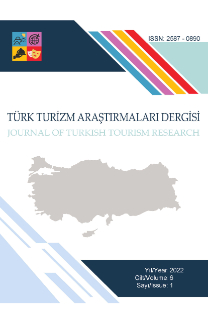Rekreasyonel Tema Parkların Ekonomik Etkileri: İsfanbul Tema Park Örneği
Economic Effects of Recreational Theme Parks: The Case of İsfanbul Theme Park
___
- Alpar, R. (2010). Uygulamalı İstatistik ve Geçerlik-Güvenirlik. Ankara: Detay Yayıncılık.
- Ap, J. and Crompton, J. L. (1998). Developing and Testing a Tourism Impact Scale. Journal of Travel Research, 37(2), 120–130. https://doi.org/10.1177/004728759803700203
- Arroyo, J. A. (2007). Economic Impacts of Theme Park Development on the Host Areas Case Study of Port Aventura and The Region of Costa Daurada, Spain. MA European Tourism Management, Bournemouth University and Universite Savoie.
- Arslan, M. Tema parkları, Plant Dergisi. (22 Eylül 2016).
- Bae, H. Y., Moon, S., Jun, J. W., Kim, T. and Ju, I. (2018). The impact of consumers’ attitudes toward a theme park: A focus n Disneyland in the Los Angeles Metropolitan Area, Sustainability. (10). 1-13.
- Balcı, A. (2011). Sosyal Bilimlerde Araştırma: Yöntem, Teknik ve İlkeler. Ankara: Pegem Akademi.
- Bobat, A. Geçmişle gelece arasında tema parklar, Plant Dergisi. (20 Eylül 2016).
- Braun, B. M. and Milman, A. (1991). Localization economies in the theme park industry. The Review of Regional Studies. Regional Science Association 20(3), 33-37.
- Braun, M. (2000). The economic impact of theme parks on regions. Neurus.
- Cengizkan, A. (2014). The economics impact of theme parks on regions. http://aocarastirmalari.arch.metu.edu.tr/files/2014/05/AOC_ARCH714_Loredana-Gal.pdf.
- Clavé, S. A. (2007). The global theme park industry. In the Global Theme Park Industry. Cambridge: CABI
- Cornelis, P. (2010). Impact of new attractions on theme park attendance. Worldwide Hospitality and Tourism Themes. 2(3), ss. 262-280.
- Crossley, J. C., Jamieson, L. M. and Brayley, R. E. (2018). Introduction to commercial recreation and tourism: An entrepreneurial approach (7. basım). Urbana, IL: Sagamore–Venture Publishing LLC.
- De Groote, P. (2011). Globalisation of commercial theme parks Case: the Walt Disney Company. APSTRACT: Applied Studies in Agribusiness and Commerce, 5(1033-2016-84139), 21-28.
- Geissler, G. L. and Rucks, C. T. (2011). The overall theme park experience: A visitor satisfaction tracking study. Journal of Vacation Marketing, 17(2), 127–138.
- George, D. and Mallery, M. (2010). SPSS for Windows Step by Step: A Simple Guide and Reference, 17.0 update (10a ed.) Boston: Pearson
- Hair, J., Black, W., Babin, B. and Anderson, R. (2010). Multivariate Data Analysis: A Global Perspective. In Multivariate Data Analysis. Upper Saddle River, NJ: Prentice Hall.
- https://tourismembassy.com/en/news/tourism-industry/impacts-of-amusement-parks-on-tourism-
- https://www.statista.com/topics/2805/amusement-and-theme-parks/
- Karasar, N. (2005). Bilimsel Araştırma Yöntemi. Ankara: Nobel Yayınları.
- Levochkina, N. A. (2018). Theme parks and their contribution to the development of territories. Earth and Environmental Science (204). 1-3.
- Lundberg, E. (2017). The importance of tourism impacts for different local resident groups: a case study of a Swedish seaside destination. Journal of Destination Marketing and Management, 6, 46-55.
- Milman, A., Okumuş, F. and Dickson, D. (2010). The contribution of theme parks and attractions to the social and economic sustainability of destinations. Worldwide Hospitality and Tourism Themes, 2 (3). 338-345.
- Nkemngu, Acha-Anyi P. (2015). Quality of life and tourism impacts: a community perspective. African Journal of Hospitality, Tourism and Leisure, 4 (1). 1-13.
- Page, S. J. (2009). Tourism Management. Managing for Change (Third Edition). Oxford: Butterworth-Heinemann.
- Raluca, D. C. and Gina, S. (2008). Theme park-the main concept of tourism industry development. Economy and Business Administration. 2. 635-640.
- Sasaki, K., Harada, M. and Morino, S. (1997). Economic impacts of theme park development by input-output analysis: a process toward local industrialization of leisure services. Managing Leisure, 2. 29-38.
- Sun, Lou- Hon and Uysal, M. (1994). The role of theme parks in tourism. Hospitality Review, 12 (1), 71-80.
- Theme Index and Museum Index: The Global Attractions Attendance Report (2018), Themed Entertainment Association.
- Ural, A. ve İbrahim, K. (2006). Bilimsel Araştırma Süreci ve SPSS İle Veri Analizi. Ankara: Detay Yayıncılık.
- Yazıcıoğlu, Y. ve Erdoğan, S. (2007). SPSS uygulamalı bilimsel araştırma yöntemleri. Ankara: Detay Yayıncılık.
- Zhang, Y., Li, W. R., Su, Q. and Hu, X. (2017). Exploring a theme park’s carrying capacity: A demand-side analysis. Tourism Management, 59, 564-578.
- ISSN: 2587-0890
- Yayın Aralığı: Yılda 4 Sayı
- Başlangıç: 2017
- Yayıncı: Prof. Dr. Yüksel ÖZTÜRK
Turizmin Etkileri Olumlu mu, Olumsuz mu? Türkiye’de Yapılmış Çalışmalara Yönelik Bir İnceleme
Yerel Halkın Özel İlgi Turizmi Açısından İnanç Turizme Bakışı: KKTC Örneği
Mehmet Necati CIZRELIOGULLARI, Özlem ALTUN, Tuğba ALTINTAŞ
Ayvacık Deve Güreşleri Festivaline Katılan Ziyaretçilerin Profili ve Memnuniyet Düzeyleri
Çift-Körleme Hakemlik Sürecinin Etkinliği Konusunda Turizm Akademisyenlerinin Düşünceleri
Güntekin ŞİMŞEK, Aziz Batuhan DİNÇEL
Yiyecek İçecek İşletmelerinde Şikâyet Yönetimi Uygulamaları: Sakarya Örneği
Küçük Ölçekli Konaklama İşletmelerinin Performansında Belirleyici Olan Unsurlar
Yeni Tüketiciler Arasındaki Kuşak Z’nin Tatil Tercihleri: Üniversite Öğrencileri Örneği
Günseli BARAN, Gamze ÖZOĞUL, Elçi̇n NOYAN
Mehmet SARIIŞIK, Urmanbek TAGMANOV
Bayramören İlçesinde Yamaç Paraşütü Turizmi
Ayhan DAĞDEVİREN, Cansel SARAL, Nariye COŞKUN, Zeynep YILMAZ
